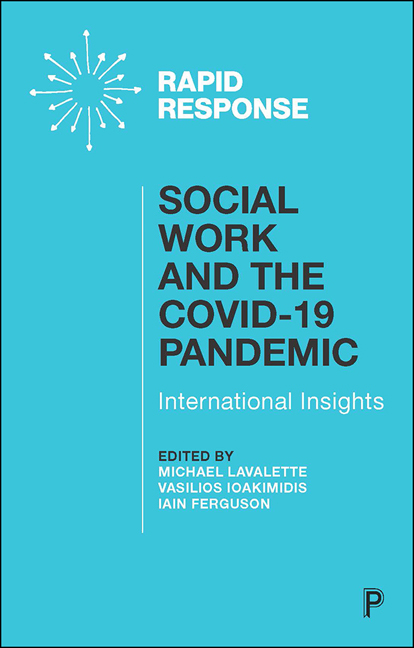7 - Business As Usual? Social Work and the COVID-19 Pandemic in Chile
Published online by Cambridge University Press: 23 March 2021
Summary
The first case of coronavirus in Chile was confirmed by the Department of Health on the 3 March 2020, when the country was still facing political uprising and massive riots that had started on the 18 October 2019 (18-O). The national plebiscite scheduled to be conducted in April 2020 – an agreement obtained as a consequence of protests aiming to define the end of the Political Constitution created during the Pinochet dictatorship – had to be postponed because of the sanitary crisis. The government established partial lockdowns and quarantines during the first months in some sectors of some cities. These selective measures that aimed to protect the functioning of markets and the health of the economy have resulted in Chile remaining in Phase 4 of the outbreak – that is, uncontrolled and widespread community transmission.
Despite policies aiming to protect market functioning, unemployment reached 11.2 per cent between March and May, a record-high level in the past ten years. Debt, precariousness and poverty have increased (Fundacion Sol 2020), to the point where a new wave of riots was unleashed in late May due to food unavailability and lack of support in the poorest areas, which was fiercely repressed by the police. “The Chilean system is even crueller than coronavirus” stated the protesters’ banners, referring to the consequences of the neoliberal experiment that historically had made Chile recognised around the world (Harvey 2005). Recently, the measures adopted by the right-wing government of Sebastian Pinera to address the corona crisis have included the launching of a new Employment Act allowing companies to suspend employment contracts or negotiate reduced work schedules with their employees; the offering of loans to families to cover subsistence needs which are granted by private banks; and the delivering of food boxes in the poorest areas – food bought from the biggest supermarket chains. These, among other strategies implemented by the government during the last months, have served as opportunities for implementing profit generation in times of crisis, as Naomi Klein (2007) has identified in her celebrated book, The Shock Doctrine.
This is not new in Chile. Even more, it was precisely the indignation of Chilean people against ‘the shock doctrine’ implemented during the dictatorship (1973– 1990) to install the neoliberal model and its effects in daily life which resulted in 18- O, one of the most significant political uprisings experienced by the Chilean society in the last century.
- Type
- Chapter
- Information
- Social Work and the COVID-19 PandemicInternational Insights, pp. 53 - 60Publisher: Bristol University PressPrint publication year: 2020

